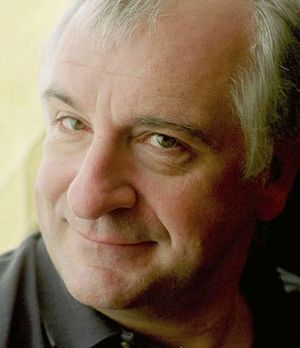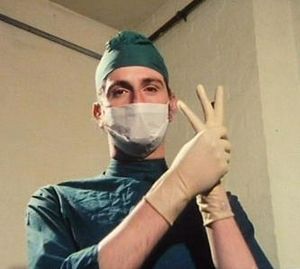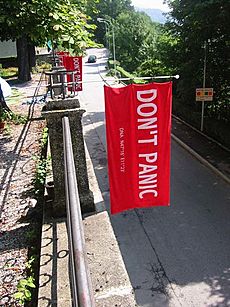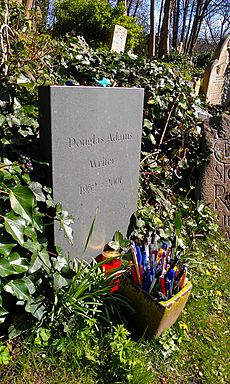Douglas Adams facts for kids
Quick facts for kids
Douglas Adams
|
|
|---|---|
 |
|
| Born | Douglas Noël Adams 11 March 1952 Cambridge, England |
| Died | 11 May 2001 (aged 49) Montecito, California, US |
| Resting place | Highgate Cemetery, London, England |
| Occupation |
|
| Alma mater | St John's College, Cambridge |
| Genre | Science fiction, comedy, satire |
| Notable work | The Hitchhiker's Guide to the Galaxy |
| Notable awards | Inkpot Award (1983) |
| Spouse |
Jane Belson
(m. 1991) |
| Children | 1 |
| Signature | |
 |
|
Douglas Noël Adams (born 11 March 1952 – died 11 May 2001) was a famous English writer and screenwriter. He is best known for his amazing science fiction comedy series, The Hitchhiker's Guide to the Galaxy.
This series started as a funny radio show on BBC Radio 4 in 1978. It became super popular and grew into a "trilogy" of five books! These books sold over 15 million copies during his lifetime. The story was also turned into a TV show, stage plays, comic books, a video game, and even a movie in 2005. Douglas Adams's work on radio is so important that he's honored in The Radio Academy's Hall of Fame.
Adams also wrote other cool books like Dirk Gently's Holistic Detective Agency (1987) and The Long Dark Tea-Time of the Soul (1988). He helped write The Meaning of Liff (1983) and The Deeper Meaning of Liff (1990), which are funny dictionaries. He also wrote Last Chance to See (1990), a book about endangered animals. He even wrote two stories for the TV show Doctor Who and helped edit its seventeenth season. After he passed away, a collection of his writings, including an unfinished novel, was published as The Salmon of Doubt in 2002.
Douglas Adams was very interested in the environment and protecting animals. He loved fast cars, new technology, and his Apple Macintosh computers. He also thought a lot about the universe and how things work.
Contents
Early Life and School Days
Douglas Adams was born in Cambridge, England, on 11 March 1952. His dad was a business consultant and his mom was a nurse. When he was a baby, his family moved to London. His sister, Susan, was born three years later.
When he was five, his parents divorced. Douglas, Susan, and their mom moved to an animal shelter run by his grandparents. Both his parents remarried, so Douglas gained four half-siblings.
School Adventures
Douglas went to Primrose Hill Primary School in Brentwood. At nine, he passed a test to get into Brentwood School. He attended the prep school from 1959 to 1964, then the main school until 1970.
Douglas was very tall for his age. By 12, he was 6 feet tall, and he stopped growing at 6 feet 5 inches! His teacher, Frank Halford, said Douglas's height made him stand out. Douglas was also known at school for his amazing stories. He was the only student Halford ever gave a perfect score of ten out of ten for creative writing. Douglas remembered this for his whole life, especially when he found it hard to write.
Some of his first writings were published in the school magazine, The Brentwoodian. He wrote about the photography club and even spoof reviews for another school magazine, Broadsheet. The editor of Broadsheet, Paul Neil Milne Johnstone, later became a character in The Hitchhiker's Guide! Douglas also designed a cover for Broadsheet and had a letter and short story published in The Eagle comic in 1965. A poem he wrote at 17 was found at the school in 2014.
After school, he went to St John's College, Cambridge in 1971 to study English. He wanted to join the Footlights, a famous comedy club for students. He eventually became a member in 1973. Even though he said he didn't do much schoolwork, he graduated in 1974.
Becoming a Writer
After college, Douglas moved back to London. He really wanted to become a writer for TV and radio. A show he performed in at university was even shown on BBC2 television in 1974.
He was discovered by Graham Chapman from the famous comedy group Monty Python. They worked together for a short time, and Douglas got a writing credit for a sketch called "Patient Abuse" in Monty Python's Flying Circus. He also helped write another sketch for a Monty Python album. Douglas is one of only two people (besides the original members) to get a writing credit for Monty Python.

Douglas also appeared briefly in two episodes of Monty Python's Flying Circus in 1974. In one, he's a surgeon, and in another, he's dressed in a funny "pepper-pot" outfit.
For a while, Douglas found it hard to get writing jobs. He took odd jobs like a hospital porter and barn builder to earn money. He even worked as a bodyguard for a wealthy family from Qatar.
He kept writing and sending in sketches, but not many were accepted. In 1976, he had a small success with a show at the Edinburgh Festival Fringe. But by Christmas, work was slow again, and he felt a bit down. Douglas often struggled with confidence about his writing. He once said, "I have terrible periods of lack of confidence."
He wrote sketches for other radio shows like The Burkiss Way and The News Huddlines. He also co-wrote an episode of Doctor on the Go. After his Hitchhiker's Guide radio series became popular, he worked as a BBC radio producer for a short time. Then, he became the script editor for Doctor Who.
Douglas also wrote scripts for two episodes of the cartoon show Doctor Snuggles with John Lloyd. John Lloyd also helped him write two episodes of the original Hitchhiker radio series and the funny The Meaning of Liff books.
Working on Doctor Who
Douglas Adams sent his script for The Hitchhiker's Guide radio show to the Doctor Who team in 1978. They liked it and asked him to write an episode called The Pirate Planet. He had also tried to pitch a Doctor Who movie script earlier, which later became his novel Life, the Universe and Everything.
Adams then became the script editor for Doctor Who's seventeenth season in 1979. He wrote three Doctor Who stories starring Tom Baker as the Fourth Doctor:
- The Pirate Planet (part of the Key to Time storyline)
- City of Death (he co-wrote this, but it was broadcast under a different name)
- Shada (this one was never fully filmed because of problems, but it was later completed with animation and shown in 2018).
Douglas Adams didn't want anyone else to write books based on his Doctor Who episodes, so for a long time, they weren't published as novels. Later, other writers adapted them into books. Some ideas from Shada and City of Death were even used in his later novel Dirk Gently's Holistic Detective Agency.
The Hitchhiker's Guide to the Galaxy
The Hitchhiker's Guide to the Galaxy started as an idea for a funny science-fiction radio show. Douglas Adams and radio producer Simon Brett pitched it to BBC Radio 4 in 1977. Douglas came up with the idea for the title while lying in a field in Innsbruck, Austria. He was looking at the stars and carrying a book called Hitch-hiker's Guide to Europe. He thought, "Someone should write a Hitchhiker's Guide to the Galaxy!"
Douglas often made up the stories as he wrote them. He got help from John Lloyd for the last two episodes of the first radio series.
BBC Radio 4 broadcast the first radio series in the UK starting in March 1978. It was also shared in the United States by National Public Radio. Because it was so popular, a second series of five episodes was broadcast in January 1980.
Douglas Adams often had trouble meeting writing deadlines. He wasn't a very fast writer and sometimes needed others to push him to finish. Once, he was even locked in a hotel room with his editor for three weeks to make sure a book was finished! He famously said, "I love deadlines. I love the whooshing noise they make as they go by." Even with these challenges, he wrote five novels in the series between 1979 and 1992.
The books led to many other versions, like comic books, an interactive computer game, and a special illustrated edition. In 1994, this edition included a "42 Puzzle" designed by Adams.
In 1980, Douglas started trying to turn the first Hitchhiker's novel into a movie. He traveled to Los Angeles many times and worked with Hollywood studios. The radio series also became a six-part BBC television mini-series in 1981. When he passed away in 2001, he was still working on getting the movie project started with Disney. The movie was finally released in 2005.
After Douglas Adams's death, the radio series continued. The third series, based on the third novel, was broadcast in 2004. With some clever editing, you can even hear Adams's voice playing a character in one episode! The fourth and fifth radio series, based on the last two novels, were broadcast in 2005. The very last episode ended with a dedication to him.
Dirk Gently Series
Between his travels for the book Last Chance to See, Douglas Adams wrote two other novels with new characters. Dirk Gently's Holistic Detective Agency was published in 1987. He described it as a mix of ghost stories, horror, detective work, time travel, and comedy, mostly about "mud, music and quantum mechanics."
A sequel, The Long Dark Tea-Time of the Soul, came out a year later. This was a completely new story. Douglas's book The Salmon of Doubt was unfinished when it was published after his death.
Music and Computers
Douglas Adams played the guitar left-handed. He had a collection of twenty-four left-handed guitars when he died. He also studied piano in the 1960s. Bands like Pink Floyd and Procol Harum had a big influence on his writing.
Pink Floyd Connection
Douglas Adams was friends with David Gilmour, the guitarist from Pink Floyd. On Adams's 42nd birthday, he was invited to play guitar with Pink Floyd at a concert in London in 1994. He played on two of their songs. Douglas Adams also chose the name for Pink Floyd's 1994 album, The Division Bell. Pink Floyd and their song "Set the Controls for the Heart of the Sun" even inspired Adams to create a rock band called Disaster Area in his book The Restaurant at the End of the Universe. This band planned to crash a spaceship into a star as a concert stunt! David Gilmour also performed at Adams's memorial service in 2001.
Computer Games and Projects
Douglas Adams loved computers and new technology. In 1984, he helped create an interactive computer game version of HHGG with Steve Meretzky. He was also involved in making another game called Bureaucracy.
Adams was one of the founders of a digital media company called The Digital Village. With this company, he created Starship Titanic, an adventure game that won awards and was nominated for a BAFTA. He was so busy with the game that Terry Jones wrote the book that went with it.
In 1999, Adams started a cool online project called h2g2. It was an experiment to try and make The Hitchhiker's Guide to the Galaxy a real thing, using the ideas of people all over the internet. The BBC hosted it for many years.
In 1990, Adams wrote and presented a TV show called Hyperland. It talked about how computers and information could be linked together, which is now called hypertext. Adams was one of the first people to use and support hypertext.
Douglas Adams bought his first word processor in 1982. He was a big fan of Apple Macintosh computers from the very beginning in 1984 until he died. He was even the first person to buy a Mac in Europe! Apple made him an "Apple Master", which meant he was a spokesperson for their products. He even made a rock video using the first version of iMovie with his daughter, Polly. He was using the first version of Mac OS X just before he passed away and thought it was "awesome."
He used email to work with others on his computer games in the early 1980s. He also posted on online forums. Douglas Adams gave speeches at big technology conferences, talking about how personal computers could be used for amazing things.
Interests and Activism
Douglas Adams was very curious about the world and had strong beliefs.
Thinking About the Universe
Douglas Adams thought deeply about the universe and how it came to be. He didn't believe in a traditional God, but he was very interested in how religion affected people and history. He loved to explore these ideas in his writing, often using humor.
He used a funny story about a "sentient puddle" to explain his thoughts. Imagine a puddle that wakes up and thinks, "Wow, this hole fits me perfectly! It must have been made just for me!" Adams used this to show that sometimes things seem to fit perfectly, but they might just be that way by chance.
The famous scientist Richard Dawkins, who was a friend of Adams, even dedicated his book The God Delusion to Douglas Adams. Dawkins said that science had lost a friend and literature had lost a brilliant writer when Adams died.
Caring for the Environment
Douglas Adams was also a passionate environmental activist. He worked hard to protect endangered species. He created a non-fiction radio series called Last Chance to See with naturalist Mark Carwardine. In this series, they traveled to see rare animals like the kakapo (a flightless parrot) and the baiji (a river dolphin). They also published a book with the same name.
In 1994, he climbed Mount Kilimanjaro while wearing a rhino suit! He did this to raise money for a charity called Save the Rhino International. Another person, William Todd-Jones, who had worn the suit in the London Marathon, also climbed with him. They raised about £100,000 to help schools in Kenya and a black rhinoceros protection program in Tanzania. Adams also actively supported the Dian Fossey Gorilla Fund.
Since 2003, the Save the Rhino charity has held an annual Douglas Adams Memorial Lecture around his birthday. These lectures continue to raise money for environmental causes.
Family Life
Douglas Adams lived in London for many years. In the early 1980s, he was in a relationship with writer Sally Emerson. He even dedicated his book Life, the Universe and Everything to her.
Later, friends introduced him to Jane Belson, a lawyer. They lived together in Los Angeles for a while when Douglas was working on a Hitchhiker's movie script. They moved back to London and got married on 25 November 1991.
Douglas and Jane had one daughter, Polly Jane Rocket Adams, who was born on 22 June 1994. In 1999, the family moved from London to Santa Barbara, California. They lived there until his death. After his funeral, Jane and Polly moved back to London. Jane Belson passed away in 2011.
Death and Lasting Impact
Douglas Adams passed away from a heart attack on 11 May 2001, when he was 49 years old. He was resting after a workout at a gym in Montecito, California. His funeral was held in Santa Barbara, and his ashes were placed in Highgate Cemetery in London in 2002. A special memorial service was held for him in London, which was the first church service ever broadcast live on the internet by the BBC.
Just two days before he died, an asteroid was named 18610 Arthurdent after a character in his books. In 2005, another asteroid, 25924 Douglasadams, was named in his memory.
In May 2002, a book called The Salmon of Doubt was published. It included many of his short stories, essays, and letters, as well as parts of his unfinished novel, The Salmon of Doubt. This unfinished novel was meant to be a new Dirk Gently story, but it might have become the sixth Hitchhiker novel.
After Adams's death, many of his projects were completed. The Shada Doctor Who story was finally finished and shown online. The last three Hitchhiker's books were made into radio shows. And the movie adaptation of The Hitchhiker's Guide to the Galaxy was released in 2005. The film even credited Adams as a producer.
A 12-part radio series based on the Dirk Gently novels was announced in 2007. A sixth Hitchhiker novel, And Another Thing..., was written by Eoin Colfer (author of Artemis Fowl) and released in 2009 with the support of Adams's family.
On 25 May 2001, two weeks after Douglas Adams died, his fans started a special tribute called Towel Day. It has been celebrated every year since then, where fans carry a towel to honor his work.
You can even see an old Apple Macintosh SE/30 computer that Douglas Adams once owned at The Centre for Computing History in Cambridge.
In 2018, a BBC Radio Four documentary talked about Douglas Adams's private papers, which are kept at St John's College, Cambridge. There's even a street named Travessa Douglas Adams in Brazil!
The annual Douglas Adams Memorial Lectures, which raise money for environmental causes, started in 2003 and are still held today.
Awards and Nominations
| Year | Award | Work | Category | Result | Reference |
|---|---|---|---|---|---|
| 1979 | Hugo Award | The Hitchhiker's Guide to the Galaxy (shared with Geoffrey Perkins) | Best Dramatic Presentation | Nominated |
Works by Douglas Adams
- The Private Life of Genghis Khan (1975) (short story)
- The Hitchhiker's Guide to the Galaxy (1978) (radio series)
- The Pirate Planet (1978) (a Doctor Who story)
- The Hitchhiker's Guide to the Galaxy (1979) (novel)
- City of Death (1979) (a Doctor Who story)
- Shada (1979–1980) (a Doctor Who story)
- The Restaurant at the End of the Universe (1980) (novel)
- A Liar's Autobiography (Volume VI) (1980) (co-authored with Graham Chapman and others)
- Life, the Universe and Everything (1982) (novel)
- The Meaning of Liff (1983) (book, with John Lloyd)
- So Long, and Thanks for All the Fish (1984) (novel)
- The Hitchhiker's Guide to the Galaxy (1984) (computer game, with Steve Meretzky)
- The Hitchhiker's Guide to the Galaxy: The Original Radio Scripts (1985) (with Geoffrey Perkins)
- Young Zaphod Plays It Safe (1986) (short story)
- A Christmas Fairly Story (1986) (with Terry Jones)
- Supplement to The Meaning of Liff (1986) (with John Lloyd and Stephen Fry)
- Bureaucracy (1987) (computer game)
- Dirk Gently's Holistic Detective Agency (1987) (novel)
- The Long Dark Tea-Time of the Soul (1988) (novel)
- The Deeper Meaning of Liff (1990) (with John Lloyd)
- Last Chance to See (1990) (book, with Mark Carwardine)
- Mostly Harmless (1992) (novel)
- The Illustrated Hitchhiker's Guide to the Galaxy (1994)
- Douglas Adams's Starship Titanic: A Novel (1997) (written by Terry Jones, based on Adams's idea)
- Starship Titanic (1998) (computer game)
- h2g2 (1999) (internet project)
- The Internet: The Last Battleground of the 20th century (2000) (radio series)
- The Hitchhiker's Guide to the Future (2001) (radio series)
- Parrots, the universe and everything (2001) (speech)
- The Salmon of Doubt (2002) (unfinished novel, short stories, essays, and interviews)
- The Hitchhiker's Guide to the Galaxy (2005) (film)
TV Shows Douglas Adams Wrote For
| Production | Notes | Broadcaster |
|---|---|---|
| Monty Python's Flying Circus |
|
BBC Two |
| Out of the Trees |
|
BBC Two |
| Doctor on the Go |
|
ITV |
| Doctor Who |
4 stories with 13 episodes (1978–1979, 1983):
|
BBC One |
| Doctor Snuggles |
|
ITV |
| Not the Nine O'Clock News |
|
BBC Two |
| The Hitchhiker's Guide to the Galaxy |
|
BBC Two |
| Hyperland |
|
BBC Two |
| Doctor Who: The Lost Episode |
|
BBC America |
Images for kids
See also
 In Spanish: Douglas Adams para niños
In Spanish: Douglas Adams para niños
 | Georgia Louise Harris Brown |
 | Julian Abele |
 | Norma Merrick Sklarek |
 | William Sidney Pittman |




